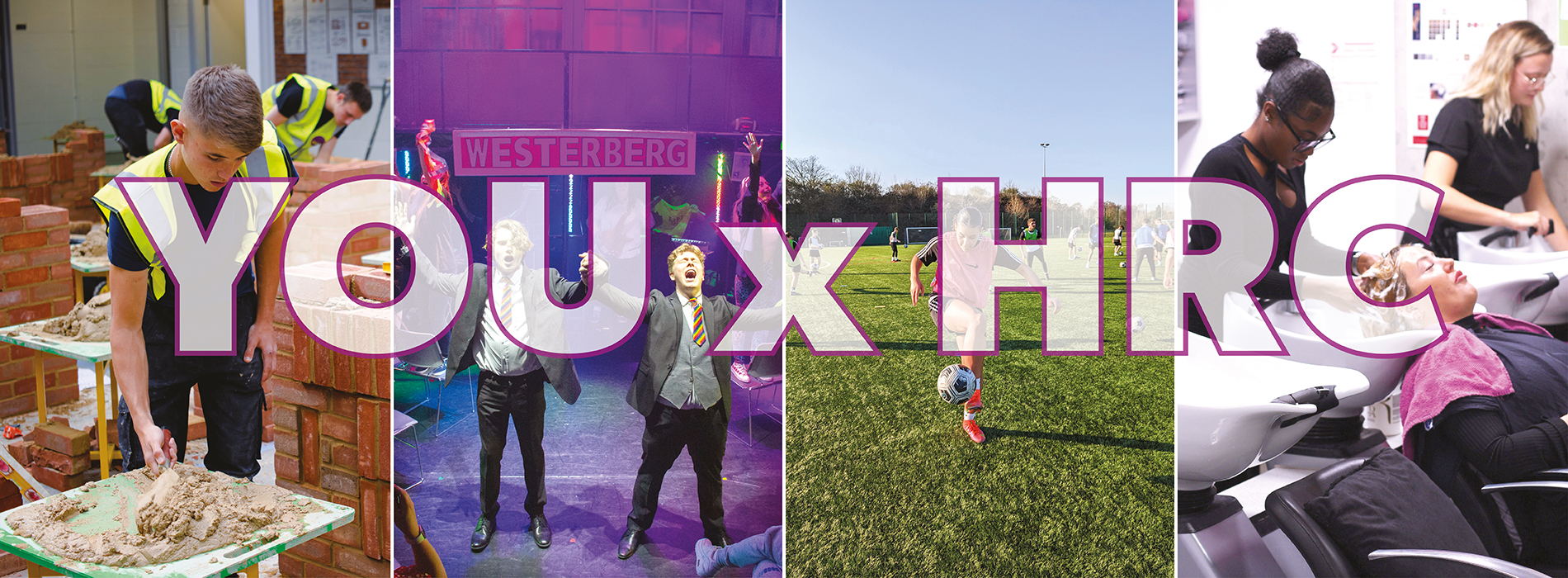This section of the strategy draws on all aspects of research, consultation and feedback from learners, staff and employers and therefore will not be a surprise to those reading it. The 10 Ambitions listed below provide guidance to all staff on areas that they should focus on to get the best out of learners. Also, all these areas are being delivered to a high standard across many departments in the college. However, the next phase of the organisations development requires an increase in consistency so that all learners at HRC benefit from them. For example, skills competitions are currently well established within Visual Merchandising and Catering courses but less so in others. Themes of inclusion and fairness in society are a core part of teaching in Childcare, Health & Social Care and Public Services but need to be pushed more to the forefront in other areas.
“We try to engage in wider events for example LGBTQ week and integrate awareness alongside skills development.” (Study Programme Lecturer)
- Staff create resources to help learners understand how the world around them, and the industries they are studying, were shaped by a diverse range of people including those with disabilities, Black, Minority Ethnic, and others with protected characteristics
- Staff and learners engage with each other in an environment that promotes tolerance and respect. They have a high level of awareness of difference and diversity, are inclusive in their behaviours and challenge stereotyping
- Staff seize opportunities to celebrate and promote difference and foster the culture of inclusivity through curriculum content and delivery
- Key performance indicators are regularly monitored to identify underperforming groups of learners so that they can be appropriately supported
“Industry simulation and involvement of employers makes learning brilliant” (HE Lecturer)
“All assessment should be fuelled by employers through work with local businesses” (Digital Media lecturer)
• Learners have a clear line of sight as to how their programme of study supports their route to employment and/or next steps
• Teaching is creatively and continuously linked to enterprise and employment through varied methods including simulations, employer visits, work placements, projects, involvement of alumni, live briefs, exhibitions, and competitions
• Assessment is reflective of industry and wherever possible includes employer briefs
• Employers are central to the design, delivery and assessment of delivery – shaping who we are.
“Contextualising and choosing the mode of delivery appropriately is important both in terms of the type of study (high needs, study programme, apprenticeship, HE), and the curriculum subject and content.” (Study Programme Lecturer)
“We need to make content appropriate for the context. For example developing a ‘post-pandemic’ unit to identify what learners need” (LLDD lecturer)
“What makes learning brilliant is a well-sequenced curriculum plan with excellent well-organised resources that enables learners to do more of the work using a coaching approach.” (HE lecturer)
• Each curriculum area and programme of study undertakes careful review and evaluation to identify which elements of the programme are best suited to which delivery mode encompassing synchronous and asynchronous modes.
• Where appropriate online and live classes are recorded, and screen shots saved to enable access to learning outside class times
• Learning is contextualised for each programme of study – learners understand the purpose and intent of the learning content and how this will support their progression
• Content is pitched to ensure relevancy to learners’ lives, interests and future destinations
“A blended approach is the way forward – I would want to use Teams even in live classrooms so that learners can access learning again outside class” (Maths lecturer)
“IT needs to be driven by teaching and learning needs and how teachers and learners consume technology” (IT manager)
“Watching learners type online and being able to give immediate feedback has been really effective.” (English lecturer)
“In the end this has been a good experience, we had to adapt.” (Lecturer, study programme, discussing teaching through lockdown)
“Staff and students have had to adapt and staff have been really challenged to think on their feet and learn new things quickly – there has been a great sense of achievement when things have been mastered” (Curriculum Area Manager)
• Learners and staff are inducted in and supported to access and use a range of technologies effectively
• Curriculum and IT support staff work creatively together to adeptly select and utilise a variety of platforms (e.g. Teams, Nearpod, Padlet, Moodle, Prowise, YouTube, Instagram, FaceBook, quizzes, industry specific and online collaborative tools, e-portfolios, graphics tablets etc.) depending on context and content
• Learners develop digital skills reflective of those expected in employment
• Learners are provided with the option to access services such as additional learning support, counselling, careers guidance, in person, online and via intermediaries
*Please see section below that outlines the range of technology currently being used by teaching staff
“Repetition and bite-sized chunks are very important – keep it simple.” (Maths lecturer)
• Learning is introduced in ‘chunks’ and reviewed and revisited to support retention of information enabling learners to make links to previous knowledge/learning
• Extensive and effective feedback is given to address learner misconceptions or errors in a timely way and to challenge learners to aim higher
• Formative assessment is used to continuously ‘take the pulse’ of learner progress and adapt teaching accordingly. Teachers provide model responses and encourage students to analyse these to raise awareness of expectations
• Frequent testing and timed challenges enable learners to identify progress made
“Learning is effective when you bring in a sense of play to lessons with lots of warm-ups and collaborative learning” (Animation lecturer)
“The powerful use of analogies helps to bring learning alive” (HE Lecturer)
• Taking part in skills competitions is a key part of learning at HRC. Learners develop their work readiness by being taken out of their comfort zones and achieve work of a high standard
• The gamification of learning is a central theme when planning face to face and online lessons. Learners should be eager to complete tasks to a high standard to progress to higher, more complex, tasks
• Dynamic and varied techniques, strategies and activities maximise engagement and ignite curiosity; e.g. work simulations, competitions, learner-led delivery, competitions and quizzes, collaborative projects, employer engagement
• Theory is delivered in innovative ways with clear links to practice and employment and powerful questioning drives high skills development and achievement
“Having a strong rapport between teachers and learners and good communication with parents and others (service staff, employers) underpins great teaching.” (High Needs lecturer)
• Peer learning is actively promoted to support collaboration and team work – including learner-led delivery, peer assessment and online learner only forums
• Teachers, additional learning support and service staff collaborate to enable learners to access appropriate resources, information and receive the support they need
• Projects are used to bring theory to life and allow learners to develop skills that will help them succeed in life and employment
• Communication with parents and guardians, work-place supervisors and employers is timely and supports learner achievement and progression
“The use of skilful and appropriate questioning to unlock potential and eliminate interference will help learners develop independence.” (HE lecturer)
“Being a reflective practitioner and reviewing where things have gone wrong and identifying how they can be improved helps to support great teaching.” (Construction lecturer)
• Teachers are skilful in identifying learner strengths and raising their awareness of what they are capable of, targeting carefully crafted questions to help learners navigate their learning and empower them to challenge themselves and others
• Research activity is encouraged to develop critical thinking and learners are actively encouraged to ‘think outside the box’ and solve problems
• Learners receive extensive feedback on work and teaching is adjusted to align and address differing needs
• Teachers encourage learners where appropriate to engage in research-based activity. Learners evaluate findings effectively and synthesise well to produce coherent, evidence-based opinions
• Learners self-assess and evaluate their own performance identifying what they need to achieve higher grades or to develop their skills
“You need to be transparent with learners about why they are doing things and how this links to assessment and employment destination.” (Study Programme lecturer)
“1-1 tutorials online have felt more private and led to learners being more open and the tutorials more productive.” (Design lecturer)
• High quality group tutorials are created centrally from the Student Services team and are consumed by learners as part of their independent study or through structured departmental programmes
• Students wider skills are enhanced and developed through participation in enrichment and are tracked as part of a Skills for Success portfolio
• Learners are provided with comprehensive induction and study preparation which includes understanding subject, level and assessment requirements, developing study skills and understanding how to maximise use of relevant digital platforms and software
• Powerful 1-1 tutorials and progress reviews are planned to provide appropriate support and address individual needs and challenges
• The development of soft skills including ‘learning how to learn’ and good study habits and routines are integrated alongside subject content to promote autonomy and high skills development
“Stepping out of my comfort zone made the difference.” (Construction lecturer)
“I want my learners to progress and be happy in their lives” (LLDD lecturer)
- Staff and learners are not afraid of making mistakes, experimenting and asking for help to unlock potential and drive high achievement
- Teachers have high expectations at all times for their learners and help them to achieve their target grades
- Learners work towards stretch targets that challenge them and take them out of their comfort zones
- Alongside development of subject-based skills and knowledge and work-ready skills learners are equipped with an awareness of their societal responsibilities and the key challenges of the 21st century –e.g. themes of inclusion, climate change awareness, health, well-being and resilience
- Success is not just about the achievement of a qualification but about exceeding expectations for each learner into their next steps – employment, entrepreneurship, higher study, self-fulfilment
|
*EdTech Resources |
How the resources are being used |
|
Flipgrid |
Video discussions, Q&A, collaborative working |
|
H5P |
Student engaged interactive activities – formative/summative assessment and collaboration |
|
|
Mainly creative industries using professional Instagram accounts to upload videos, demonstration of skills, showcasing work, assessments and collaboration |
|
Kahoot |
Class based interactive gaming system, live, competition, provides formative assessment |
|
Microsoft Teams |
Student engagement, collaboration, live lessons, breakout rooms, assignments and chat function |
|
Moodle |
VLE used to store learning resources and communicate with learners |
|
My Maths |
Interactive lessons, revision resources, formative assessment and tracking of progress made |
|
Nearpod |
Interactive presentations, live student feedback, and formative assessment |
|
Office: 365/Stream/Forms/Powerpoint Live/Word |
Office suite of resources |
|
Onedrive |
Shared documents and storage space for work |
|
Padlet |
Interactive collaboration, bulletin board, display, share topic specific links, images, videos and feedback |
|
Promonitor |
Tracking of learner progress and ILPs |
|
Prowise |
Interactive whiteboard, collaboration space, live quizzes, formative assessment and feedback |
|
Quizlet |
Interactive study resources, learning activities, collaboration, competitions and formative assessment |
|
SmartAssessor |
Apprenticeship learner tracking portfolio and interactive tool |
|
Turnitin |
Plagiarism checker, submission of assignments and feedback |
|
Wakelet |
Collaboration board, video, links and images |






